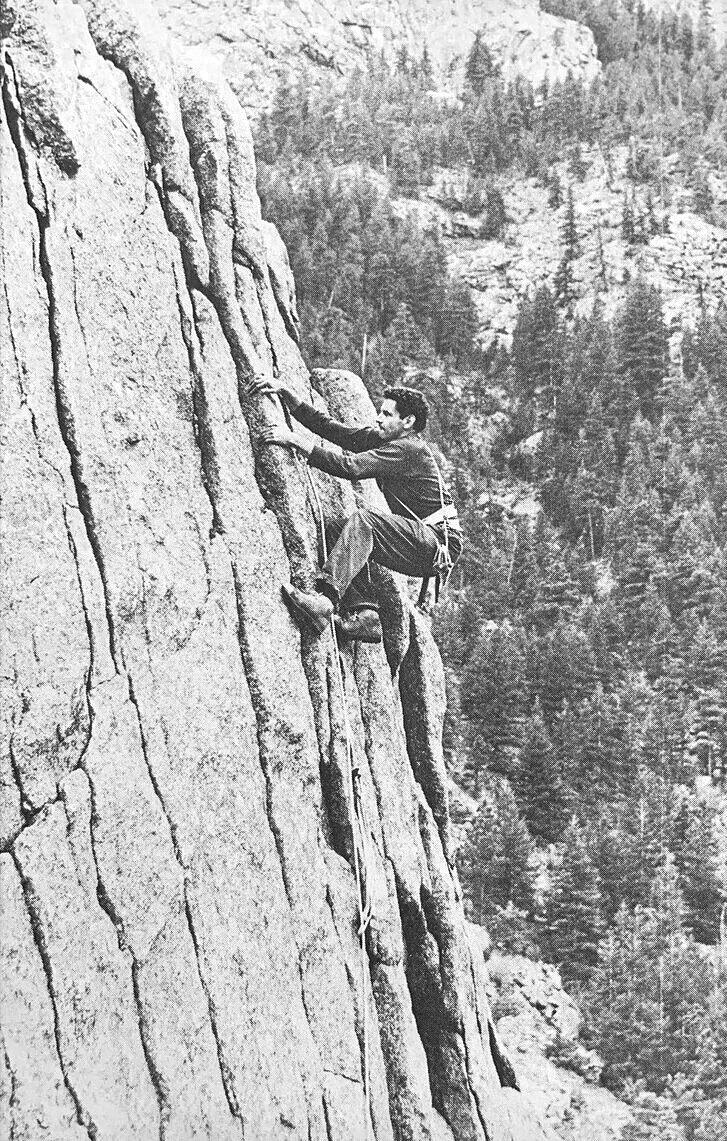1965: My First Mentor
I don’t remember how I first met Gary Spitzer, but I started climbing with him when I was fourteen. Gary was 29 and an English professor at C.U. He rode a Ducati-500 motorcycle wearing aviator sunglasses, and he was one of the better climbers in the Boulder area, solid B-team. The A-team was Layton Kor and his young proteges, Pat Ament and Larry Dalke. I think Gary was looking for a belayer to support him on his tick list of climbs, and apparently this skinny kid who was up for anything would suffice. For me it was a huge opportunity to get better.
We must have hit it off because we climbed regularly for the next year and a half. I remember Gary arriving at my house on his Ducati, roaring up the driveway to our basement door. I’m sure my parents were struggling with sending their young son off on a motorcycle to go climbing, but because Gary was a college professor they must have had some hope this would work out. And for me it was very exciting to zoom off on the back of a big motorcycle bound for Boulder Canyon or Eldorado. I can’t remember exactly how we got both of us plus all our climbing gear on one motorcycle.
We climbed many of the classic Kor routes like Northwest Corner, Outer Space, Rosy Crucifixion, and Grandmother’s Challenge. These were all still aid climbs with only a handful of ascents at this time, and it was somewhat notable when anyone repeated them. At the beginning Gary was the rope-gun and I was very happy to be following - my contemporaries and I would never have been able to do any of these climbs. I was progressing and maturing rapidly under Gary’s influence, and began leading more and more. I was also seeing less and less of my peers.
My mentorship with Gary reached its zenith with our climb of the Hypotenuse on the East Face of Longs Peak in the summer of 1966 when I was fifteen. This was an aid climb just left of the Diamond that had recently been put up, and we did the second ascent. I have very little memory of the details of this climb – I don’t remember where we spent the night or much else about the climb itself, except that it was uneventful and we alternated leading. What I do remember is that the whole experience of being on Longs Peak, carrying loads for three days, and climbing at nearly 14,000 feet was physically far beyond anything I had ever done. On the long hike out my legs were cramping, and I was exhausted almost to the point of delirium. Although nothing had gone wrong, this was another butt-thrashing of major proportions, my first taste of climbing on Longs Peak.
After the Hypotenuse, Gary and I both knew that our time together was naturally over, and I was ready to move on in my evolution as a climber. Our trajectories as climbers were nearly opposite - he was at his peak and would probably never be much better, while I was one of the most precocious and promising young climbers in Colorado. We were not friends outside of climbing – our age disparity ruled that out – so we parted ways naturally and with appreciation for each other.
I climbed with Gary one last time a year or so later. While he was leading the first pitch of the Wisdom in Eldorado, a piton he was testing with body weight ripped out. He had forgotten to clip the rope through the piton he was on, and the pitons below all failed to catch him, so he plummeted down onto the rock ramp below. The rope barely went tight as I helplessly watched him crash and crumple like a rag doll. Luckily, he did not injure his head or back, and the Rocky Mountain Rescue Group arrived soon to evacuated him. I visited him in the hospital until he was well enough to go home, but he never climbed again and we lost touch. The last thing I learned from my first mentor was that careless mistakes could be very costly. But I did not for a moment consider quitting climbing.
Photo of Gary Spitzer climbing on the 4th Elephant Buttress, from High Over Boulder.
